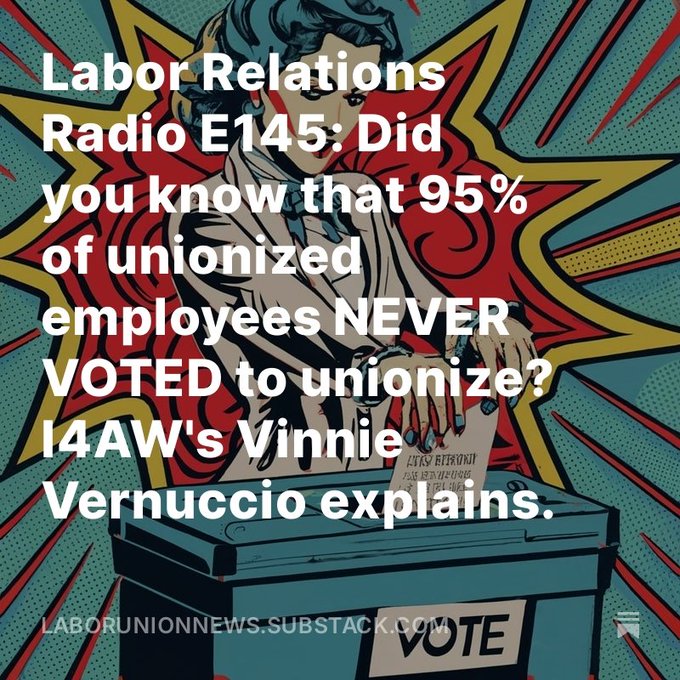Posts tagged private sector
NEW YORK: Hochul Report Whitewashes Teachers Union Antisemitism; Commentary
October 31, 2024 // Months before Hamas’s Oct. 7 attacks on Israel, a CUNY Law commencement speaker delivered what one commentator described as a “Nuremburg-style screed” against Israel, accusing it of murder and lynchings. CUNY’s administration called the speech “unacceptable.” Meanwhile, the PSC, led by Davis, demanded that CUNY — not the speaker — retract its statement. After the Oct. 7 attacks, the union allowed “CUNY4Palestine” to promote anti-Israel rallies on the union’s email list and later condemned Columbia University for dispersing a pro-Hamas student encampment.
Opinion: How to Cool Down Labor Unrest at the Ports
October 31, 2024 // Congress should put ports under the same labor-relations law that governs railroads and airlines.

The Highest Stakes Commentary: Kim Kavin
October 16, 2024 // In this version of the ABC Test, Part B states that a person can only be a legally operating independent contractor if: The person performs work that is outside the usual course of the hiring entity’s business. That line has been an unmitigated income- and career-destroyer for Californians in more than 600 professions. It hit everyone from comedians who could no longer perform at comedy clubs to translators who could no longer provide translation services for translation companies to freelance writers who could no longer write articles for publishers. Owner-operator truckers are still battling in the courts and trying to explain how it could decimate the supply chain, with the threat of taking so many self-employed truckers off the road. The damage to people’s livelihoods was so significant that within a year—just one year—of AB5 going into effect:
Boeing drama: Imagine if a recent proposal to pay striking workers UI benefits had become law
October 1, 2024 // Giving UI benefits to striking workers would create an imbalance between business and labor, make strikes more frequent and lengthy, increase costs and services for consumers and hurt other workers in the state who are told they can rely on unemployment benefits. Giving fund dollars to people choosing not to work should offend all Washington state workers. These union-favor bills failed to pass the finish line in the last moments of the 2024 session, but big labor promises the policy proposal will be back. I hope lawmakers aren’t into it, especially after being able to clearly see what a Boing strike could do to the fund.
More Workers Are Filing For — and Winning – Union Elections Than in Any Year in the Past Decade
September 12, 2024 // A surge in union activity since the COVID-19 lockdown shows no signs of stopping, though it’s still not enough to reverse the two-decade downward trend in union membership in New York and across the nation.

Labor Relations Radio E145: Did you know that 95% of unionized employees NEVER VOTED to unionize? I4AW’s Vinnie Vernuccio explains.
September 4, 2024 // As Americans, every two, four, or six years, we head to polls to cast our ballots for who we want to represent us. For unionized workers in the private sector, the vast majority never voted to unionize. According to a new study [in PDF] by the Institute for the American Worker (I4AW), 95 percent of private sector union workers under the National Labor Relations Act (NLRA) are represented by a union they have never voted for.
Connecticut has most unionized public sector in the country
September 3, 2024 // Between 2018 and 2023, the number of public sector union members in Connecticut surged, making Connecticut the state with the highest percentage of unionized public sector workers in the country, and the fifth-highest rate of overall union membership, according to the latest numbers from Unionstats.com The figures, derived from Census data, show 15.8 percent of the state’s entire workforce is a union member, and 16.9 percent of workers are covered by a collective bargaining agreement. Those percentages have stayed relatively steady, but the actual numbers of union members have increased, even as Connecticut’s workforce has decreased.
The Accidental Success of the NLRA: How a Law about Unions Achieved Its Goals by Giving Us Fewer Unions
August 30, 2024 // The Wagner Act was passed to promote labor peace. It aimed to keep commerce flowing by promoting collective bargaining, and thus unionism. Taft-Hartley reversed one part of that policy: it helped make unionism, and thus collective bargaining, less common. But by doing so, it finally achieved labor law’s original goal. The labor market today is more peaceful than at any time in the last century. And that peace owes in large part to the relative scarcity of unions. That lesson is worth keeping in mind in contemporary debates. Today, voices on both sides of the aisle laud the benefits of unionism. They speak of unions as vehicles of workplace democracy—a productive way for workers to express their collective discontent. But unions have not always funneled discontent through peaceful channels: when given too much power, they have disrupted the avenues of commerce.
Union, hospital face more lawsuits from Michigan nurse over dues
August 23, 2024 // Madrina Wells, from Grand Blanc Township, had already sued Ascension Genesys Hospital and Teamsters in July, accusing them of threatening to fire her and a coworker for not signing forms authorizing the union to deduct dues from their paychecks. Now, Wells is filing additional complaints against those organizations for deducting union dues out of her paycheck anyway, without her providing the consent forms.

Commentary: Unions are bad for cities
August 16, 2024 // The truth is that unionization doesn’t even increase wages for all union members. Single-salary schedules ensure that senior members earn the most and new members the least, regardless of value or merit. While union leaders may brag about the union member premium — the ostensibly higher wages that unionized workers earn — it only exists for older members, where it exists at all. What’s more, unions’ seniority layoff system protects longer-serving union members before anyone else. The most junior employees are the first to be let go and the last to be rehired. Last-in-first-out layoffs do nothing to improve productivity, but they do a lot to protect senior members.
